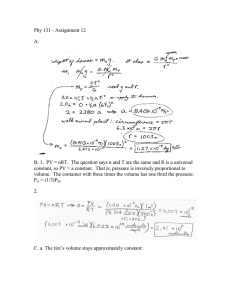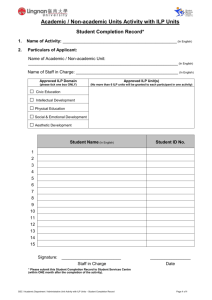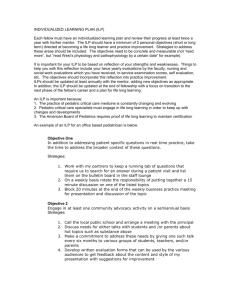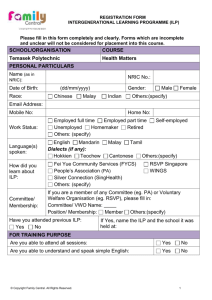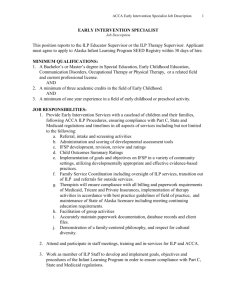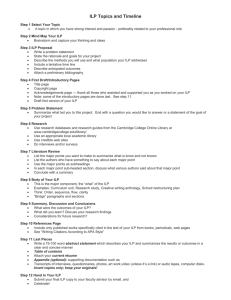RECORDING INDEPENDENT LIVING SERVICES IN CWS/CMS
advertisement
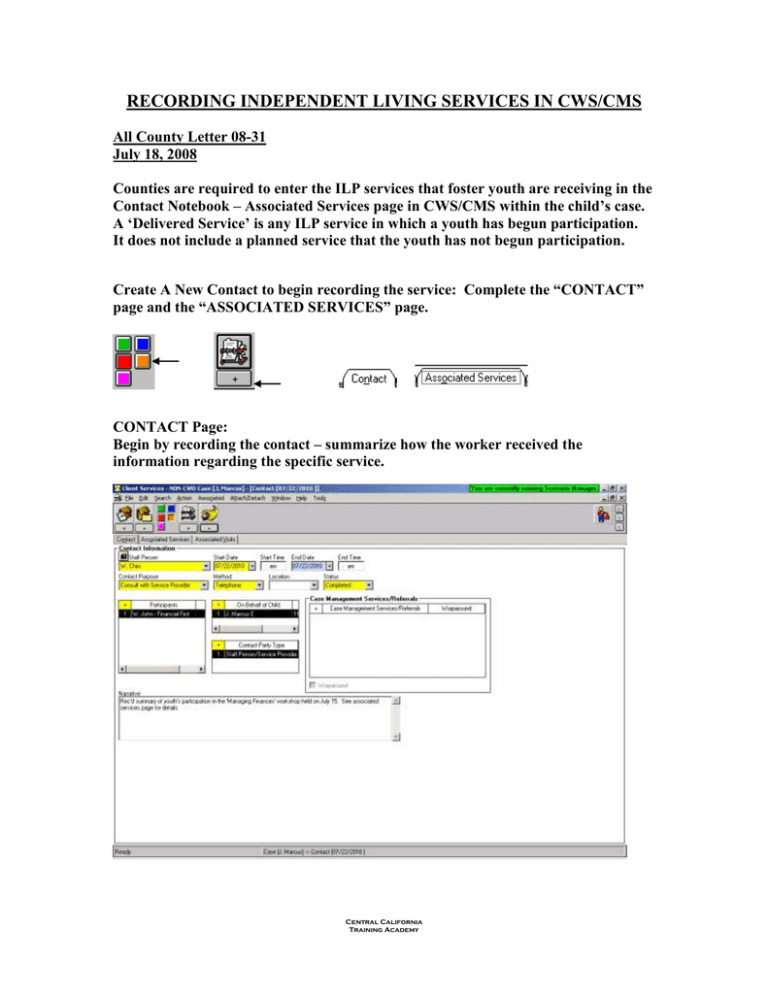
RECORDING INDEPENDENT LIVING SERVICES IN CWS/CMS All County Letter 08-31 July 18, 2008 Counties are required to enter the ILP services that foster youth are receiving in the Contact Notebook – Associated Services page in CWS/CMS within the child’s case. A ‘Delivered Service’ is any ILP service in which a youth has begun participation. It does not include a planned service that the youth has not begun participation. Create A New Contact to begin recording the service: Complete the “CONTACT” page and the “ASSOCIATED SERVICES” page. CONTACT Page: Begin by recording the contact – summarize how the worker received the information regarding the specific service. Central California Training Academy ASSOCIATED SERVICES Page: Complete this page with details of the actual service. Use the binoculars here to do a Service Provider search. If the provider is already in the database, it will be under this dropdown menu after you search. If you are unable to find the Service Provider in your search…..then Create the Service Provider: Complete the ID / Address pages with as much information as possible. Use the Service Provider Category of ILP Provider. Central California Training Academy SEARCH Tips: Many service providers are already in the database, the trick is finding them. You can search with provider’s first and last name, or agency name, or any combination. There is no phonetic search – that means that your spelling has to be just right, or you will not find the provider. Use the ‘Wild Card’ for additional search power. Example: Searching for the provider: Financial First Surrounding the word ‘financial’ with the percent signs – is asking for any provider with the word financial in it. Here is an example of what that search effort returned: Central California Training Academy Definitions of the ILP Service Categories: 1. ILP needs assessment. An independent living needs assessment is a systematic procedure to identify a youth’s basic skills, emotional and social capabilities, strengths, and weaknesses to match the youth with appropriate independent living services. An independent living needs assessment may address knowledge of basic living skills, job readiness, money management abilities, decision-making skills, goal setting, task completion, and transitional living needs. 2. ILP Mentoring. Mentoring means that the youth has been matched with a screened and trained adult for a one-on one relationship that involves the two meeting on a regular basis. Mentoring can be short-term but it may also support the development of a long-term relationship. While youth often are connected to adult role models through school, work, or family, this service category only includes a mentor relationship that has been facilitated or funded by the child welfare agency or its staff. 3. ILP Education. Academic supports are services designed to help a youth complete high school or obtain a General Equivalency Degree (GED). Such services include the following: academic counseling; preparation for a GED, including assistance in applying for or studying for a GED exam; tutoring; help with homework; study skills training; literacy training; and help accessing educational resources. Academic support does not include a youth’s general attendance in high school. 4. ILP Education Post-secondary. Post-secondary educational support are services designed to help a youth enter or complete college, and include the following: classes for test preparation, such as the Scholastic Aptitude Test (SAT); counseling about college; information about financial aid and scholarships; help completing college or loan applications; or tutoring while in college. 5. ILP Education financial assistance. Education financial assistance includes payments for education or training, including allowances to purchase textbooks, uniforms, computers, and other educational supplies; tuition assistance; scholarships; payment for educational preparation and support services (i.e., tutoring),and payment for GED and other educational tests that are paid for or provided by the State agency. This financial assistance also includes vouchers for tuition or vocational education or tuition waiver programs paid for or provided by the State agency. 6. ILP Career/Job Guidance. Career preparation services focus on developing a youth’s ability to find, apply for, and retain appropriate employment. Career preparation includes the following types of instruction and support services: Vocational and career assessment, including career exploration and planning, guidance in setting and assessing vocational and career interests and skills, and help in matching interests and abilities with vocational goals; job seeking and job placement support, including identifying potential employers, writing resumes, completing job applications, developing interview skills, job shadowing, receiving job referrals, using career resource libraries, understanding employee benefits coverage, and securing work permits; retention support, including job coaching; learning how to work with employers and other employees; understanding workplace values such as timeliness and appearance; and understanding authority and customer relationships. 7. ILP Employment/Vocational/Training. Employment programs and vocational training are designed to build a youth’s skills for a specific trade, vocation, or career through classes or on-site training. Employment programs include a youth’s participation in an apprenticeship, internship, or summer employment program and do not include summer or after-school jobs secured by the youth alone. Vocational training includes a youth’s participation in vocational or trade programs in school or through nonprofit, commercial or private sectors and the receipt Central California Training Academy of training in occupational classes for such skills as cosmetology, auto mechanics, building trades, nursing, computer science, and other current or emerging employment sectors. 8. ILP Money Management Budget and financial management assistance includes the following types of training and practice: living within a budget; opening and using a checking and savings account; balancing a checkbook; developing consumer awareness and smart shopping skills; accessing information about credit, loans and taxes; and filling out tax forms. 9. ILP Consumer Skills. Housing education includes assistance or training in: locating and maintaining housing, including filling out a rental application and acquiring a lease, handling security deposits and utilities, understanding practices for keeping a healthy and safe home; understanding tenants rights and responsibilities, and handling landlord complaints. 10. ILP Health Care. Health education and risk prevention includes providing information about: hygiene, nutrition, fitness and exercise, and first aid; medical and dental care benefits, health care resources and insurance, prenatal care and maintaining personal medical records; sex education, abstinence education, and HIV prevention, including education and information about sexual development and sexuality, pregnancy prevention and family planning, and sexually transmitted diseases and AIDS; substance abuse prevention and intervention, including education and information about the effects and consequences of substance use (alcohol, drugs, tobacco) and substance avoidance and intervention. Health education and risk prevention does not include the youth’s actual receipt of direct medical care or substance abuse treatment. 11. ILP Room and Board Financial Assistance. Room and board financial assistance includes payments that the State agency makes or provides for room and board, including rent deposits, utilities, and other household start-up expenses. 12. ILP Transitional Housing. Supervised independent living means that the youth is living independently under a supervised arrangement that is sponsored, facilitated, or referred to by the child welfare agency. A youth in supervised independent living is not supervised 24-hours a day by an adult and often is provided with increased responsibilities, such as paying bills, assuming leases, and working with a landlord, while under the supervision of an adult. 13. ILP Home Management. Home management includes instruction in food preparation, laundry, housekeeping, living cooperatively, meal planning, grocery shopping and basic maintenance and repairs. 14. ILP Parenting Skills. Such services include education and information about parenting, responsible fatherhood, childcare skills, and teen parenting. 15. ILP Interpersonal/Social Skills. Such services include education and information about safe and stable families, healthy marriages, spousal communication and domestic and family violence prevention. 16. ILP Financial Assistance Other. Other financial assistance includes any other payments made or provided by the State agency to help the youth live independently. 17. ILP Transportation. Arranging transportation to and from an activity or training/employment including issuing of bus passes and gas voucher. 18. ILP Other. Issuing of stipends or incentives. Central California Training Academy
